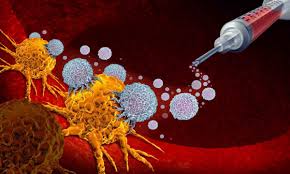Types of Immunotherapy Available Today
Immunotherapy for cancer is a groundbreaking treatment that uses the body’s immune system to fight cancer. It has become a critical tool in the fight against various types of cancer. Immunotherapy for cancer works by either boosting the immune system’s natural abilities or providing it with new components that enhance its ability to target and kill cancer cells.
Below are the main types of immunotherapy available today.
1. Monoclonal Antibodies
Monoclonal antibodies are lab-created molecules that mimic the immune system’s ability to fight off harmful pathogens such as viruses and bacteria. These antibodies are designed to target specific cancer cells. Once they bind to these cells, they can mark them for destruction or block the signals that allow the cancer cells to grow. Monoclonal antibodies are often used in the treatment of various cancers, including breast cancer and colorectal cancer. They can be used alone or in combination with other treatments.
2. Checkpoint Inhibitors
Checkpoint inhibitors are a class of drugs that work by blocking checkpoint proteins from binding with their partner proteins. These proteins are often used by cancer cells to evade detection by the immune system. By blocking this interaction, checkpoint inhibitors can help the immune system recognise and attack cancer cells. These drugs have been especially successful in treating melanoma, non-small cell lung cancer, and renal cell carcinoma, among others.
3. Cancer Vaccines
Cancer vaccines are designed to stimulate the immune system to recognise and attack cancer cells. Unlike traditional vaccines that prevent infections, cancer vaccines work to treat existing cancer. They introduce specific antigens into the body that help the immune system identify and target cancer cells. Some vaccines are preventative, such as the HPV vaccine, which helps prevent cervical cancer, while others are therapeutic, such as the Bacillus Calmette-Guérin (BCG) vaccine for bladder cancer.
4. Immune System Modulators
Immune system modulators are substances that help the body’s immune system function more efficiently. These modulators can be used to enhance the body’s natural immune response or to reduce immune system suppression caused by cancer cells. By boosting the immune system’s activity, these treatments allow the body to fight cancer more effectively. Examples of immune system modulators include interferons and interleukins.
5. Adoptive Cell Transfer (ACT)
Adoptive cell transfer (ACT) is a type of immunotherapy where immune cells are taken from the patient, modified or expanded in the lab, and then reintroduced into the patient’s body. This technique allows doctors to provide the patient with a large number of cancer-fighting immune cells that are more capable of attacking the tumour. ACT has shown great promise in treating cancers like leukaemia and melanoma, though it remains a complex and expensive treatment.
Conclusion
Immunotherapy for cancer has transformed cancer treatment, offering new hope with therapies like monoclonal antibodies and adoptive cell transfer. Lung cancer risk factors, such as smoking and environmental exposure, are crucial in determining the right treatment plan, allowing doctors to personalise care.
Immunotherapy is a versatile and evolving treatment option, with ongoing advancements offering great promise for the future of cancer care. Understanding the available options helps patients make informed decisions.













